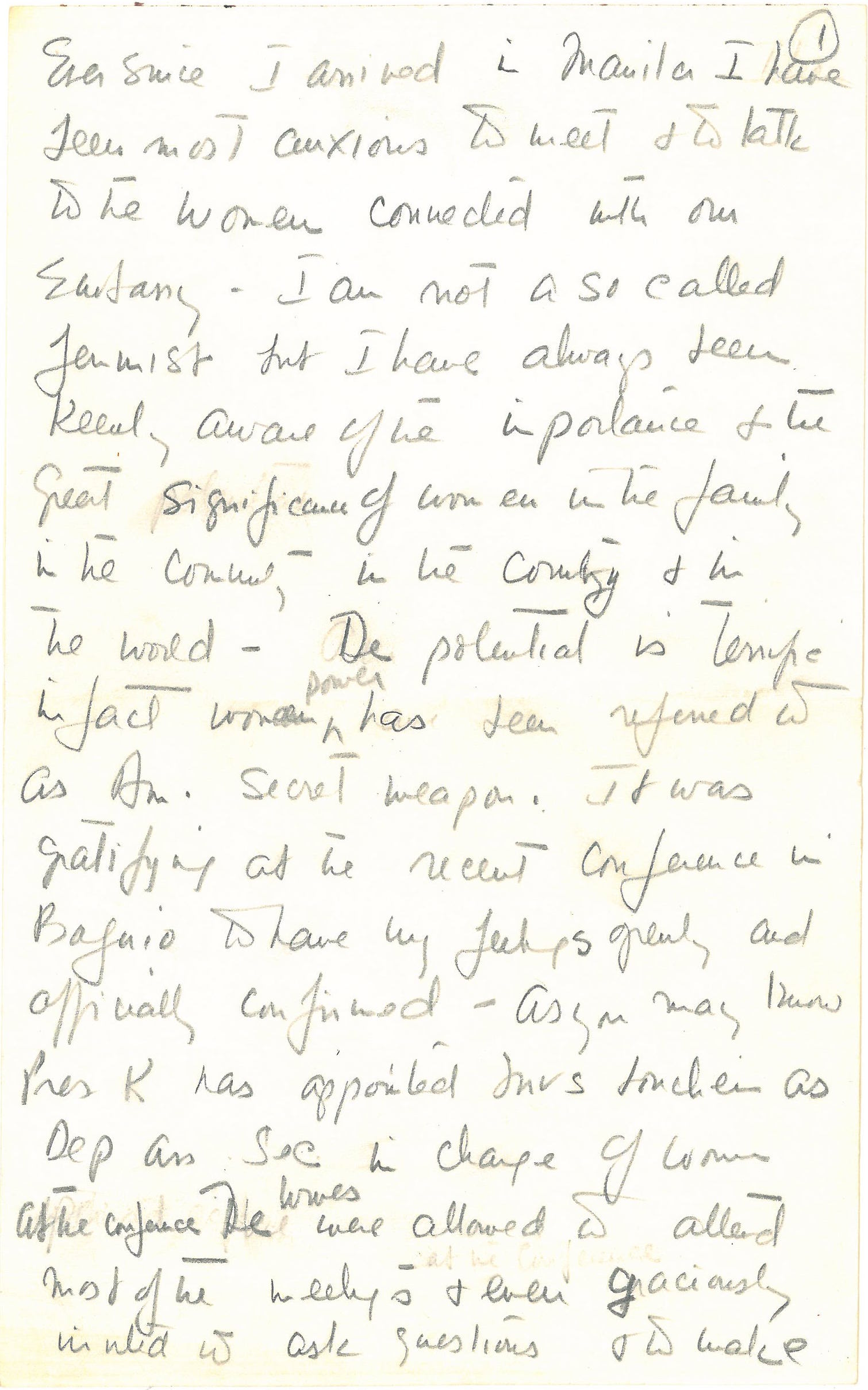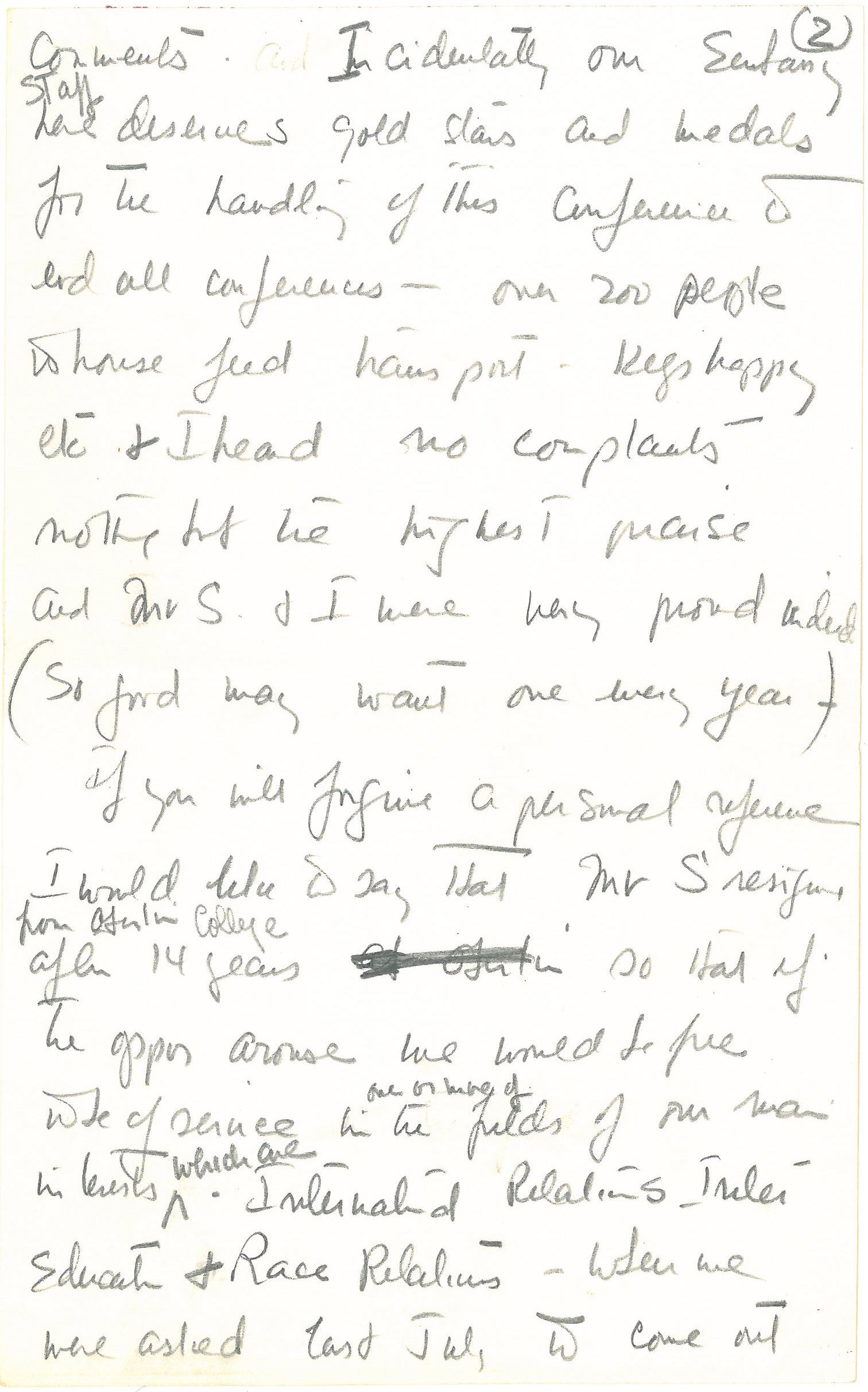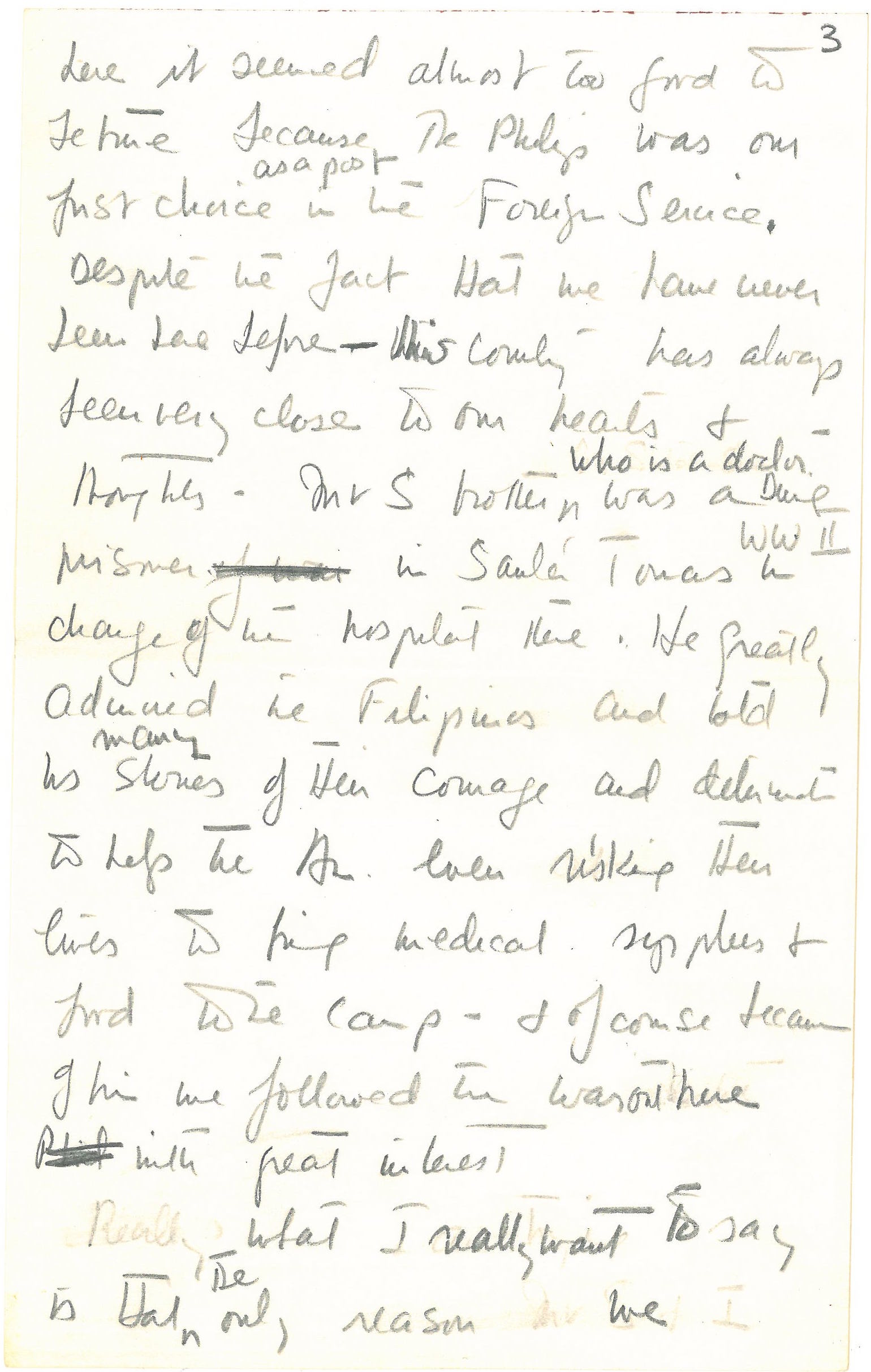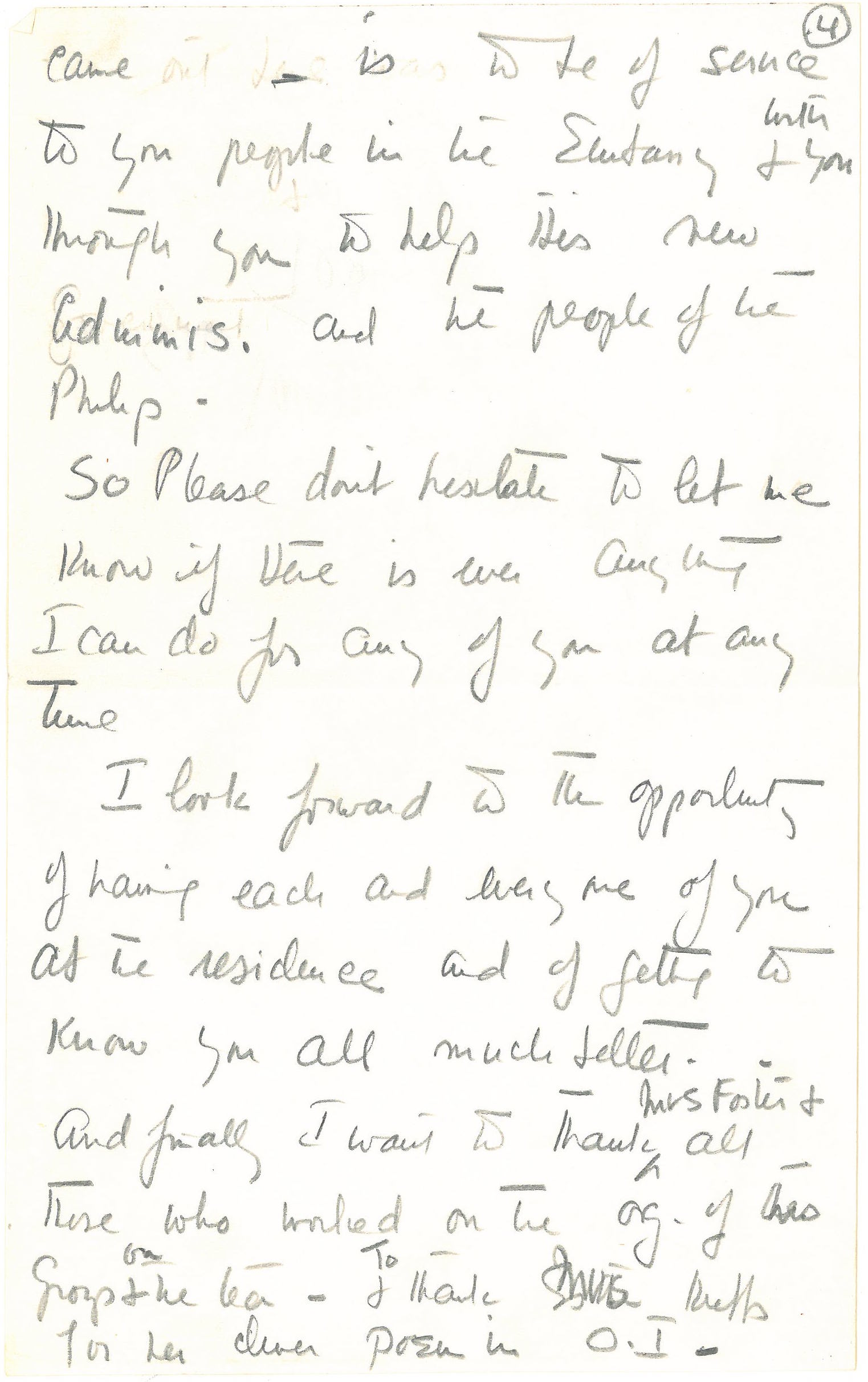    |
Transcription:
Ever since I arrived in Manila I have been most anxious to meet & to talk to the women connected with our Embassy – I am not a so called Feminist but I have always been keenly aware of the importance & the great significance of women in the family in the comunity [sic], in the country & in the world – The potential is terrific in fact woman [inserted above line: power] has been referred to as Am. Secret weapon.[2] It was gratifying at the recent conference in Baguio[3] to have my feelings openly and officially confirmed – As you may know Pres K[4] has appointed Mrs [Louchheim][5] as Dep Ass Sec[6] in charge of women at the conference. The [inserted above line: wives] were allowed to attend most of the meetings & even graciously invited to ask questions & to make comments. Incidentally our Embassy [insert above line: Staff] here deserves gold stars and medals for the handling of the conference to end all conferences – over 200 people to house feed transport – Keep happy etc & I heard no complaints nothing but the highest praise and Mr S[7]. & I were very proud indeed (So good may want one every year-) If you will forgive a personal reference I would like to say that Mr S’ [resigned?] [inserted above line: from Oberlin College] after 14 years at Oberlin so that if the oppor [sic] arouse [sic] we would be free to be of service in [inserted above line: one or more of] the fields of our main interests [inserted above line: which are]. International Relations Inter[8] Education & Race Relations – when we were asked last July to come out here it seemed almost too good to be true because The Philip[9] was our first choice [inserted above line: as a post] in the Foreign Service. Despite the fact that we have never been here before – this country has always been very close to our hearts & thoughts. Mr S brother[10] [inserted above line: who is a doctor, was a [illegible] prisoner of war in Santo Tomas[11] [inserted above line: WWII] in charge of the hospital there. He greatly admired the Filipines [sic] and told us [inserted above line: many] stories of their courage and determination to help the Am. even risking their lives to [illegible] medical supplies & food to the camp[12] – & of course because of him we followed the war out here Phil with great interest [erased: Really] what I really want to say is that [inserted above line: the] only reason we Came — is to be of service to you people in the Embassy & [inserted above line: with] you through you to help this new Adminis.[13] [sic] And the people of the Philip [sic] – So Please don’t hesitate to let me know if there is ever anything I can do for any of you at any time I look forward to the opportunity of having each and every one of you at the residence and of getting to know you all much better. And finally I want to thank [inserted above: Mrs Foster[14] &] all those who worked on the org . of this group & [inserted above line: on] the tea – & [inserted above line: To] thank [Mrs?] [illegible][15] for her clever poem in O.I[16] –
[Transcribed by Sarah Ulstrup.] |
[1] “Philippines – The Period of U.S. Influence | History – Geography | Britannica.com.” Accessed 11 July 2016. Source.
[2] While the source of this quote is unclear, it was commonly used (“Partners in Winning the War: American Women in World War II.” National Women’s History Museum. Accessed 5 July 2016. Source).
[3] This appears to have been a Regional Operations Conference for U.S. Ambassadors and their advisors in East and Southeast Asia, held in Baguio, Philippines from March 12-14 in 1962. The conference was headed by Chester Bowles, U.S. Ambassador at large, but as the Ambassadors in the Philippines and thus the de facto hosts of the conference, undoubtedly the Stevensons were very much involved in the organization and logistics of the event. Though the conference was specifically for the Ambassadors, their wives also attended, a fact which gratified Bowles. He said “the attendance of the ambassadors’ wives was an important innovation. As every Foreign Service officer knows, a wife sensitive to local problems, aware of our government’s interests and objectives and eager and able to help can be a tower of strength in any overseas mission, large or small. For better or worse, it is the ambassador’s wife who sits beside the highest officials of foreign governments at dinners and formal functions. Thus, to broaden their knowledge and understanding of our objectives and operations, the wives attended all but the most highly classified discussions.” Presumably Bowles made a similar statement about the importance of ambassadors’ wives at the conference itself, which is what Stevenson is so pleased about here (Lee H. Burke, Ambassador at Large: Diplomat Extraordinary. (The Hague: Martinus Nijhoff, 1972), 89-90. Source).
[4] President John F. Kennedy.
[5]Katie Louchhim (1903-1991) was born Kathleen Scofield. She was heavily involved in U.S. politics after her husband was brought to Washington in 1934 to organize the Security and Exchange Commission for the New Deal. She served as the Vice-Chairwoman of the Democratic National Committee from 1956 to 1960, as well as serving in the Office of Foreign Relief and Rehabilitation, and both helped establish and serve in the United Nations Relief and Rehabilitation Administration. She was given a post in the State department by John F. Kennedy, and within two years was named the Deputy Assistant Secretary for Public Affairs, which at the time was the highest position ever held by a woman within the department. She also held other posts within the State Department, and became a United States Ambassador to the United Nations Economic, Scientific and Cultural Organization. Apart from her political work, she was also an accomplished poet (Glenn Fowler, “Katie Louchheim Is Dead at 87; Official for U.S. and Democrats.” The New York Times, 12 February 1991, sec. Obituaries. Source).
[6] Deputy Assistant Secretary
[7] “Mr S” refers to Eleanor’s husband, William Stevenson
[8] “Inter” is possibly short for international in this context.
[9] “Philip” is an abbreviation for the Philippines.
[10] This is probably Theodore Dwight Stevenson (1903-1999), whom the 1940 U.S. Census listed as a doctor. From the same census, it seems he had also lived in Canton, China (where his wife was born) in the 1930s. He was married to a Beatrice Stevenson (b.circa 1911) and they had two sons: Donald, then age four, and David, age 2 (“Theodore Dwight Stevenson – Facts.” Ancestry.com. Accessed 5 July 2016. Source).
[11] The Santo Tomas Internment Camp, also called the Manila Internment Camp, was located at the University of Santo Tomas in Manila, Philippines. The camp was established in January of 1942, after Japanese forces took Manila. American civilians living in the Philippines, as well as American POWs and many members of the American Red Cross, were interned there until 1945. Conditions in the camp varied over the course of the war, from being relatively comfortable to severely overcrowded for the civilians, and from horrendous to sometimes fatal for the the captured soldiers (Frederic Harper Stevens, Santo Tomas Internment Camp. (New York: Stratford House Inc., 1946), Source).
[12] Many accounts of internment camps in the Philippines speak of the aid offered to imprisoned U.S. soldier by sympathetic Filipinos, who also often carried information between the camps. A number of men credit their survival within the camps to that aid (Doris Weatherford, American Women and World War II. History of Women in America. (New York: Facts on File, 1990), 5-7).
[13] Probably referring to the Kennedy Administration.
[14] This person could not be identified, she is presumably one of the women within this group.
[15] This person could not be identified.
[16] This publication could not be identified.